Early construction of legal corridor to meet the requirements of organizational arrangement
- What is the significance of the 9th extraordinary session of the 15th National Assembly opening this morning, February 12, sir?
- The 9th extraordinary session of the 15th National Assembly, held immediately after the 13th Party Central Committee Conference (January 2025), is of special importance in order to immediately implement Conclusion No. 121-KL/TW and Conclusion No. 123-KL/TW of the Central Committee to focus on solving a number of very urgent issues, removing institutional bottlenecks to unblock and liberate all resources, take advantage of all opportunities, and maximize potentials and strengths to develop the country quickly and sustainably.
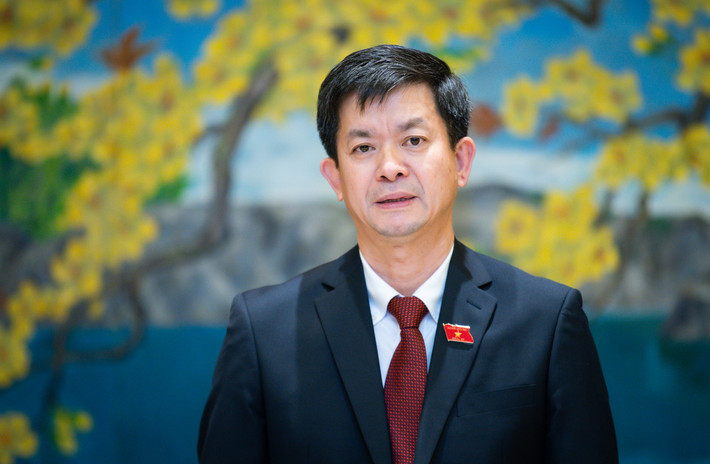 The Secretary General of the National Assembly and Head of the National Assembly Office said that the 9th Extraordinary Session of the 15th National Assembly, held right after the 13th Party Central Committee Conference (January 2025), is of special importance.
The Secretary General of the National Assembly and Head of the National Assembly Office said that the 9th Extraordinary Session of the 15th National Assembly, held right after the 13th Party Central Committee Conference (January 2025), is of special importance.
At the session, the National Assembly will consider and decide on 17 contents with two key groups of tasks:
Firstly, amend and supplement the laws on organizational structure and the law on promulgation of legal documents to create a legal framework for implementing the revolution in streamlining the organizational structure of the political system. The National Assembly will consider and pass the Law on Promulgation of Legal Documents (amended) and 8 laws and resolutions related to the arrangement and organization of the apparatus, including: Law amending and supplementing a number of articles of the Law on Organization of the National Assembly; Law on Organization of the Government (amended); Law on Organization of Local Government (amended); Resolution of the National Assembly on the structure of the number of Government members for the term of the 15th National Assembly; Resolution of the National Assembly on the structure of the Government for the term of the 15th National Assembly; Resolution of the National Assembly on handling a number of issues related to the arrangement of the state apparatus; Resolution of the National Assembly on the organization of National Assembly agencies; Resolution of the National Assembly on the number of members of the Standing Committee of the 15th National Assembly.
Second, the National Assembly will consider and decide on a number of important and urgent issues, including: The supplementary project on socio-economic development in 2025 with a growth target of 8% or more to promptly perfect the legal system, clear, mobilize and effectively use investment resources, contributing to creating a solid foundation to achieve a growth rate of 8% or more in 2025 and double-digit growth in the period 2026 - 2030; Resolution of the National Assembly on piloting a number of specific and special mechanisms and policies to develop the urban railway network system in Hanoi and Ho Chi Minh City; Consider and decide on specific mechanisms and policies for investment in the construction of the Ninh Thuan nuclear power project; Consider and decide on the investment policy for the Lao Cai - Hanoi - Hai Phong railway construction investment project; Resolution of the National Assembly on piloting a number of policies to remove obstacles in science, technology and innovation activities; Plan for additional investment in charter capital for the period 2024 - 2026 of the parent company - Vietnam Expressway Corporation (VEC). In addition, the National Assembly will also consider and decide on personnel work under its authority.
Immediately after the Central Executive Committee Conference held at the end of January, the agencies of the National Assembly and the Government closely coordinated and urgently completed the contents submitted to the National Assembly in the spirit of running and lining up at the same time, promoting the highest responsibility and intelligence of both sides. Despite the urgent requirements on progress, time pressure, and many difficult and complicated contents, the quality of the contents so far has basically met the requirements, qualified to be submitted to the National Assembly for consideration and decision, including major fundamental issues that have been discussed, thoroughly evaluated, agreed upon and ensured the quality of submission to the National Assembly by the National Assembly Party Committee, the Government Party Committee, the National Assembly Standing Committee, and the Government.
- With 8 draft laws and resolutions related to organizational structure, during the discussion, consideration and approval process at the 9th Extraordinary Session, in your opinion, what issues need to be noted?
- The draft laws and resolutions submitted to the National Assembly for consideration and approval at the 9th Extraordinary Session were commented on by the National Assembly Standing Committee at the recent 42nd Session. The contents submitted to the National Assembly had a high level of consensus between the Government and the agencies in charge of the review. However, when commenting at the 42nd Session, National Assembly Chairman Tran Thanh Man and the National Assembly Standing Committee requested the agencies to continue to review carefully and cautiously to ensure the highest quality because these are very important draft laws and resolutions, creating a legal basis for the organization and smooth, efficient and effective operation of the apparatus after the arrangement.
Regarding the draft Law on Government Organization (amended), the National Assembly Standing Committee especially emphasized the requirement to study, revise and perfect the contents on "decentralization" and "authorization" to ensure consistency with the draft Law on Organization of Local Government (amended) and related laws and draft laws, creating favorable conditions for decentralized agencies to proactively handle work, clarifying the responsibilities of decentralized agencies and decentralized agencies, and not providing for further decentralization.
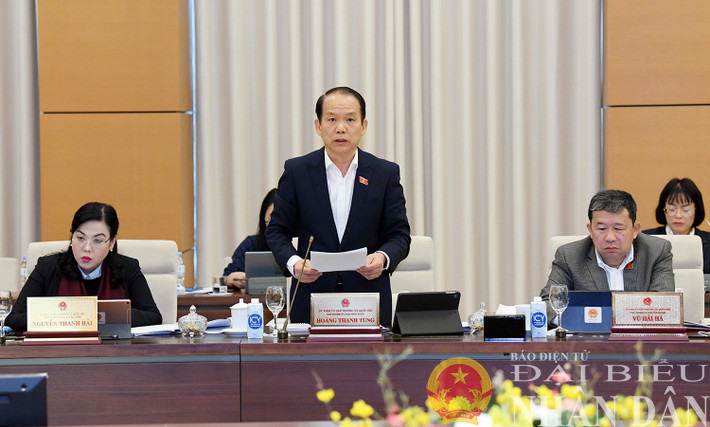 The Chairman of the Law Committee spoke about the content of the draft Law on Organization of Local Government (amended) at the 42nd Session of the National Assembly Standing Committee, February 5, 2025. Photo: Lam Hien
The Chairman of the Law Committee spoke about the content of the draft Law on Organization of Local Government (amended) at the 42nd Session of the National Assembly Standing Committee, February 5, 2025. Photo: Lam Hien
Regarding the draft Law on Organization of Local Government (amended), the National Assembly Standing Committee proposed to define authority, decentralization, delegation, and authorization; continue to review and revise to ensure consistency and clarity in subjects, objects, methods of decentralization and authorization, responsibility regime, and conditions to ensure the implementation of decentralization and authorization.
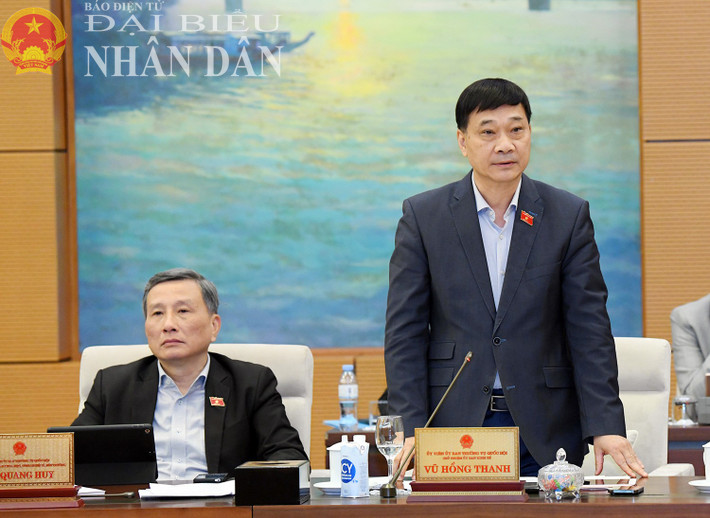 Chairman of the Economic Committee Vu Hong Thanh speaks about the content of the draft Law on Organization of Local Government (amended) at the 42nd Session of the National Assembly Standing Committee, February 5, 2025. Photo: Lam Hien
Chairman of the Economic Committee Vu Hong Thanh speaks about the content of the draft Law on Organization of Local Government (amended) at the 42nd Session of the National Assembly Standing Committee, February 5, 2025. Photo: Lam Hien
Regarding the draft Resolution on handling a number of issues related to the reorganization of the state apparatus, the National Assembly Standing Committee requested the Government to clearly identify the work items that need to be implemented, the responsibilities of agencies and organizations, the deadline for completion, and have a specific list of laws and resolutions of the National Assembly that need to be amended and supplemented in the coming time to meet the requirements of the work of reorganization of the state apparatus.
Flexible, harmonious, effective combination of short-term and long-term solutions
- Regarding the project to supplement the socio-economic development plan for 2025 with a growth target of 8% or more, in your opinion, what should be noted to achieve short-term goals without causing risks to macro balances?
- Submitting to the National Assembly the adjustment of the economic growth target of 8% or more in 2025 is extremely important not only in the short term but also lays the foundation for continuous double-digit growth in the 2026-2030 period. As General Secretary To Lam emphasized, "these are the goals that must be strived for so that our country can escape the middle-income trap, by 2030 become a developing country with modern industry and high average income, and by 2045 become a developed country with high income".
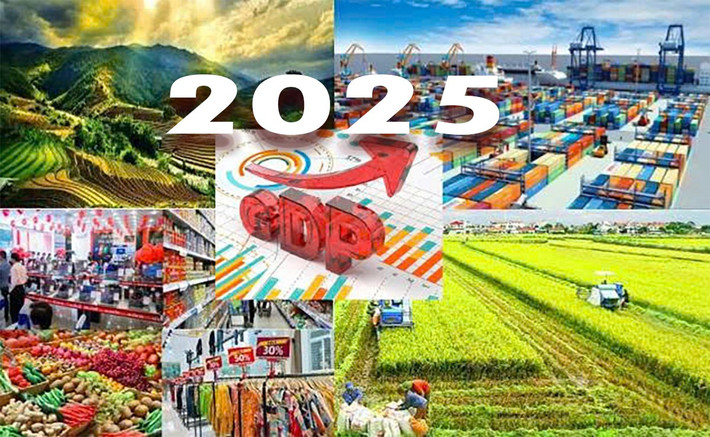 GDP growth target in 2025. Illustration photo. Source: ITN
GDP growth target in 2025. Illustration photo. Source: ITN
To successfully achieve the GDP growth target of 8% or more in 2025, we must resolutely and effectively implement the main tasks and solutions according to Conclusion No. 123-KL/TW of the Central Committee, Resolution No. 158/2024/QH15 of the National Assembly and, depending on the actual situation, have appropriate management solutions to promote economic growth and macroeconomic stability. In particular, we must continue to strengthen endogenous capacity, promote rapid and sustainable economic growth, and in particular, maintain macroeconomic stability, considering this a fundamental goal in the context of a volatile world situation, to create a solid foundation for growth and sustainable development in the coming period.
In particular, the implementation period for the adjusted targets is only about 10 months, so management must be extremely flexible, effectively combining short-term and long-term solutions. We are determined to achieve the growth target but must maintain the foundation for sustainable and long-term development, especially maintaining macroeconomic stability, major economic balances, ensuring social security, national defense and security.
The National Assembly Standing Committee also requested the Government to complete the draft Resolution submitted to the National Assembly in a specific direction, going straight to the content that needs to be expressed, especially the targets and objectives; at the same time, it is necessary to adjust the tasks and additional solutions compared to Resolution No. 158 of the National Assembly to fully and comprehensively institutionalize Conclusion 123-KL/TW of the Central Committee to achieve the growth target of over 8%; have practical and effective solutions to attract social investment, and implement the policy of taking public investment as the driving force for private investment, because a breakthrough in growth requires a breakthrough in social investment.
- New thinking, new ways of doing things, breakthroughs in institutions and solutions; decentralization and radical decentralization... are identified by the Government as one of the conditions to ensure the successful implementation of the growth target of 8% or more. Along with the contents presented to the National Assembly at the 9th Extraordinary Session, in your opinion, what issues need to continue to be implemented to ensure this condition?
- The contents submitted to the National Assembly for consideration and decision at the 9th Extraordinary Session have thoroughly grasped the Central Committee's viewpoint on continuing to focus on promoting 3 strategic breakthroughs, especially institutional breakthroughs because this is the "breakthrough of breakthroughs". From draft laws and resolutions on organizational structure to investment policies and specific policy mechanisms to implement key projects on railways, urban railways, Ninh Thuan nuclear power... all focus on removing institutional bottlenecks, ensuring that policies and goals are implemented smoothly and most effectively. However, after the Session, it is still necessary to continue to closely follow the requirement of growth reaching over 8% and Conclusion 123 of the Central Committee to specifically determine the roadmap, responsibilities, and develop and submit to the National Assembly laws and resolutions of the National Assembly, ensuring a legal corridor for achieving the growth target in 2025 and the following years; Strictly implement the General Secretary's direction on guiding and adjusting a number of laws related to land, public investment, and enterprise law, remove all bottlenecks and barriers, and implement the "results-based management" method, strongly shifting from "pre-inspection" to "post-inspection" associated with strengthening inspection, supervision, and control of power.
In the process of building and perfecting institutions, agencies need to thoroughly grasp the requirements for innovation in law-making thinking, ensuring the time and quality of promulgating laws, resolutions and guiding documents; at the same time, they must continue to improve the effectiveness of law enforcement and focus on resolving bottlenecks in law enforcement so that all policies and laws can be implemented in life as quickly and effectively as possible.
- Thank you very much, Secretary General of the National Assembly!
Performed by Quynh Chi
Source: https://daibieunhandan.vn/giai-phong-moi-nguon-luc-tan-dung-moi-co-hoi-dua-dat-nuoc-phat-trien-post404204.html


![[Photo] Prime Minister Pham Minh Chinh receives delegation from the US-China Economic and Security Review Commission of the US Congress](https://vphoto.vietnam.vn/thumb/1200x675/vietnam/resource/IMAGE/2025/5/7/ff6eff0ccbbd4b1796724cb05110feb0)


![[Photo] General Secretary attends the parade to celebrate the 80th anniversary of the victory over fascism in Kazakhstan](https://vphoto.vietnam.vn/thumb/1200x675/vietnam/resource/IMAGE/2025/5/7/dff91c3c47f74a2da459e316831988ad)
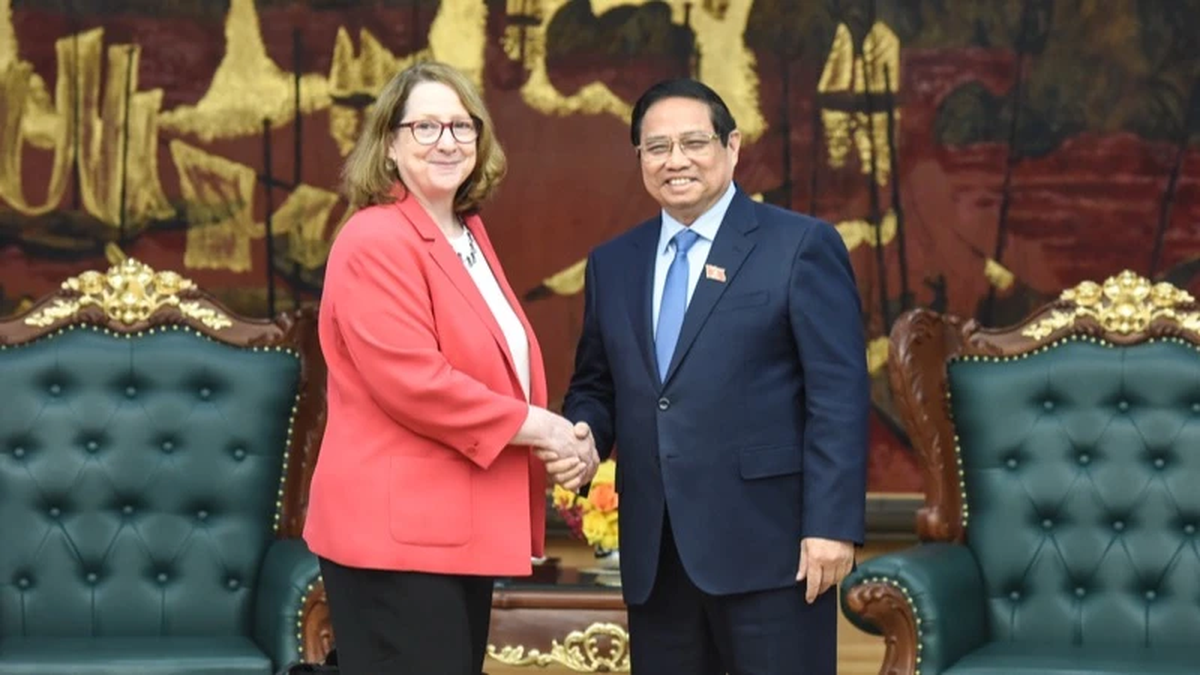



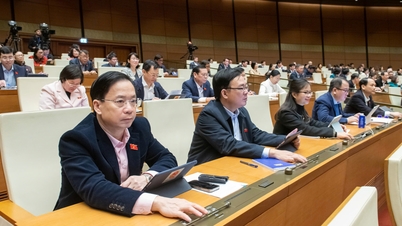


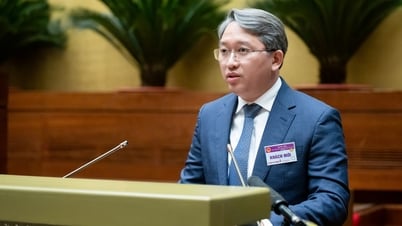


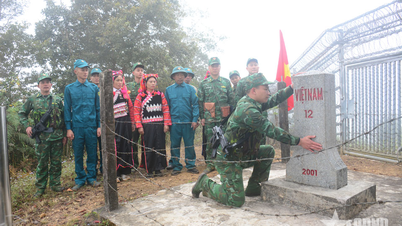







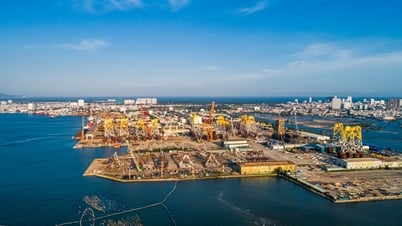





![[Photo] Sparkling lanterns to celebrate Vesak 2025](https://vphoto.vietnam.vn/thumb/1200x675/vietnam/resource/IMAGE/2025/5/7/a6c8ff3bef964a2f90c6fab80ae197c3)
















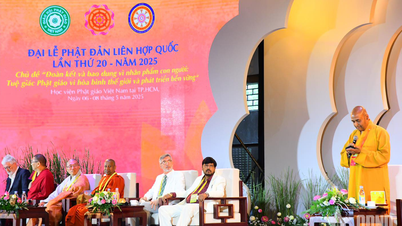



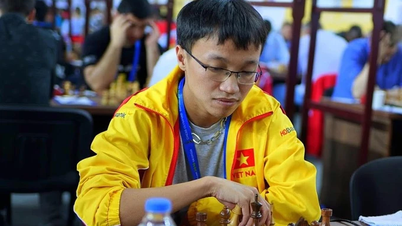





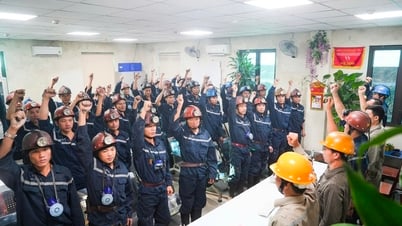

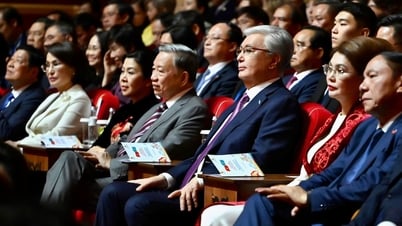


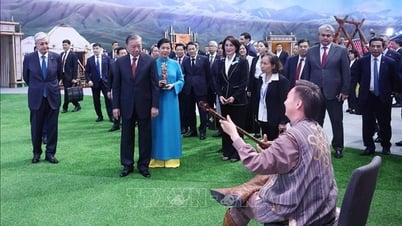
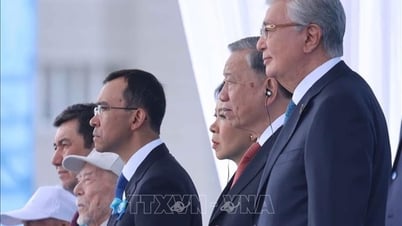

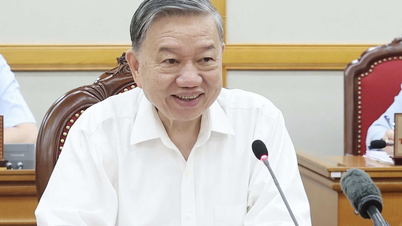


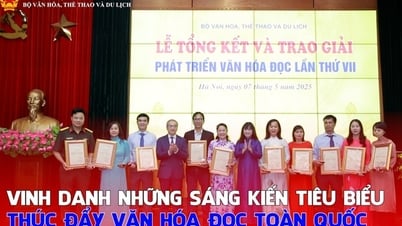

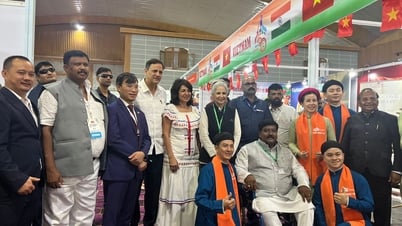







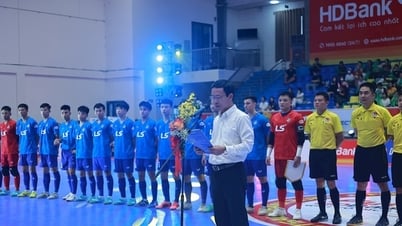



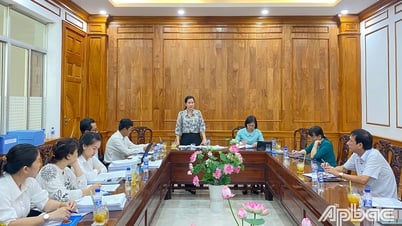

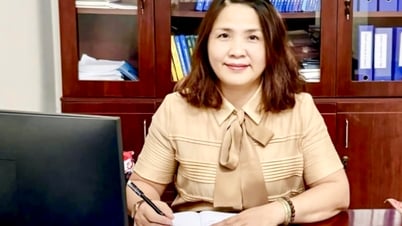











Comment (0)